When choosing the right platform for building and hosting your WordPress website, two names often come up: WP Engine and WordPress.com. While both offer powerful solutions for creating WordPress sites, they cater to different needs and offer distinct experiences. WP Engine is a premium, managed hosting provider specifically optimized for WordPress, providing businesses, developers, and agencies with a high-performance environment. It’s ideal for users who require advanced customization, top-notch security, and expert support.
On the other hand, WordPress.com is a website-building platform that handles both the hosting and creation of WordPress websites. With options ranging from a free plan to various paid tiers, it appeals to beginners, bloggers, and small businesses seeking a straightforward, easy-to-use solution for their website needs.
In this article, we’ll explore the key differences between WP Engine and WordPress.com, comparing them across various aspects such as performance, customization, security, pricing, and support. By the end, you’ll have a clear understanding of which platform is the best fit for your website, whether you’re just starting out or need a robust, scalable hosting solution.
What is WP Engine?
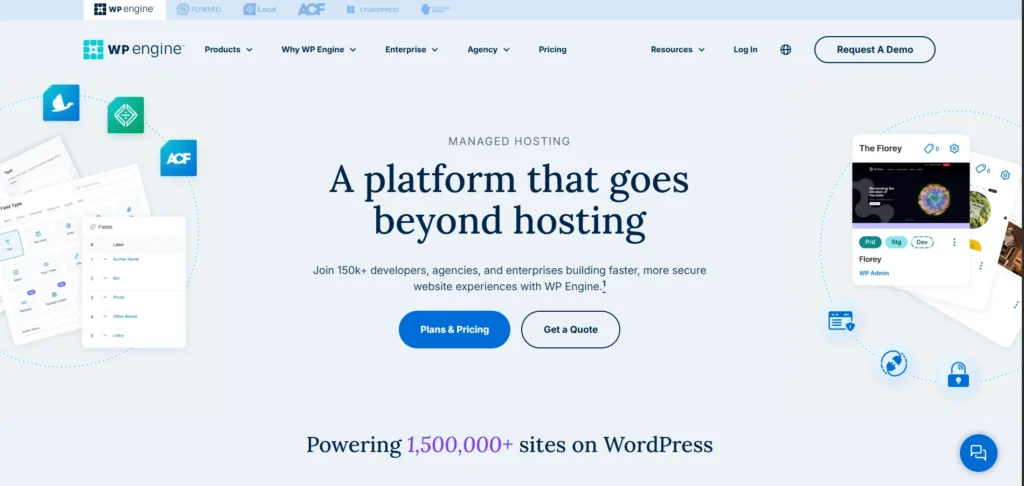
WP Engine is a managed WordPress hosting platform, which means that it provides optimized infrastructure and support specifically designed to run WordPress websites. Their focus is on offering high-performance hosting with robust security, daily backups, and expert customer support. WP Engine is generally targeted at businesses, developers, and agencies that need a specialized, high-quality hosting environment for WordPress.
Key Features of WP Engine:
- Managed Hosting: WP Engine handles server management for you, allowing you to focus on your website content.
- High Performance: Built for speed, with optimized servers and a content delivery network (CDN) to speed up page load times.
- Automatic Updates and Security: WordPress updates are automatically applied, and the platform offers daily backups and security scanning.
- Staging Environments: The ability to test changes in a staging environment before pushing them live.
- Customer Support: Access to 24/7 expert support that understands the intricacies of WordPress.
What is WordPress.com?
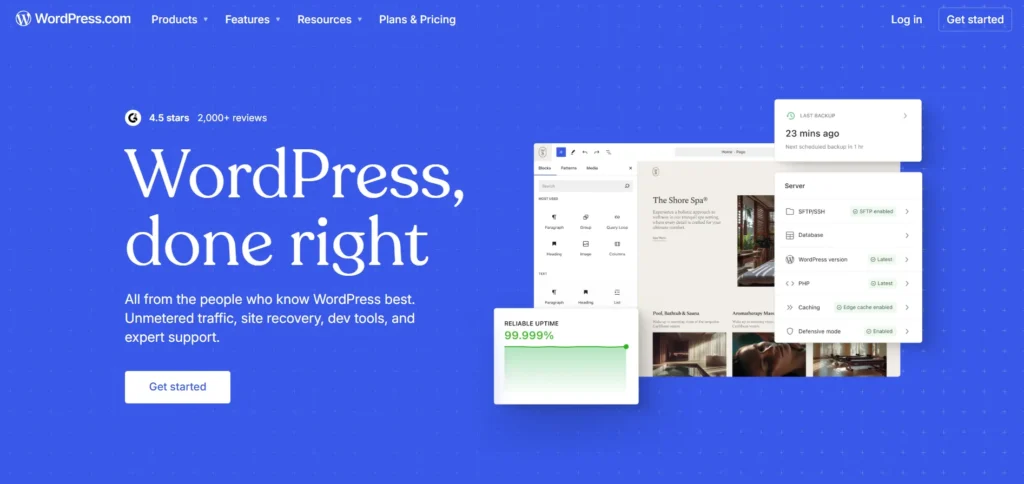
WordPress.com is a website-building platform that hosts WordPress sites for you. Unlike WP Engine, it’s not just a hosting provider—it’s an all-in-one solution where you can create, customize, and host your WordPress site. WordPress.com offers several plans, including a free plan, which makes it a popular choice for individuals, bloggers, and small businesses.
Key Features of WordPress.com:
- Free Plan: WordPress.com offers a free plan with limited features for personal blogs and simple websites.
- Easy Setup: You don’t need to worry about setting up servers, domains, or hosting yourself. Everything is managed by WordPress.com.
- Limited Customization: Compared to WP Engine, customization options on WordPress.com are more limited, especially on lower-tier plans.
- Basic Security: WordPress.com includes SSL certificates and regular updates as part of their service.
Performance and Speed: Where WP Engine Excels
One of the major distinctions between WP Engine and WordPress.com is in performance.
WP Engine:
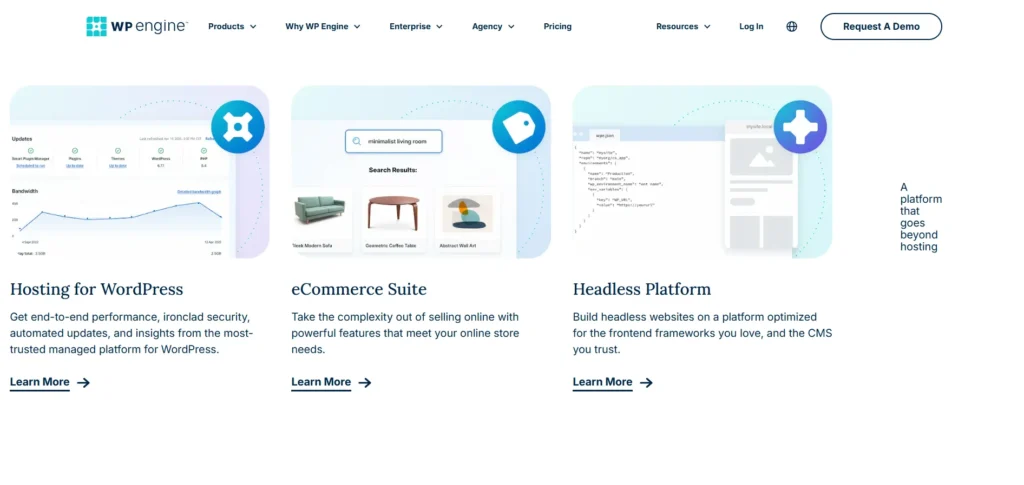
WP Engine is specifically built to deliver excellent performance for WordPress sites. Their hosting platform is optimized for speed with the use of advanced caching technologies like EverCache, which caches content at multiple levels, ensuring that pages load as quickly as possible. Additionally, WP Engine integrates with a global Content Delivery Network (CDN), which stores copies of your website’s content on servers across the world, reducing the time it takes to load your site for users regardless of their location.
WP Engine’s infrastructure is built with high-performance needs in mind. Whether you have a personal blog, an eCommerce store, or a business site, WP Engine’s platform is built to handle traffic spikes and heavy loads without compromising on performance.
WordPress.com:
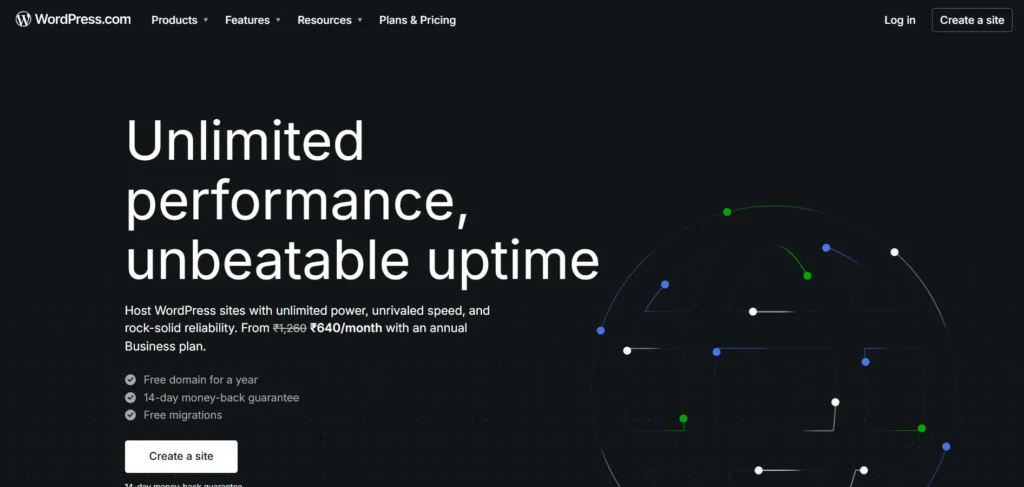
WordPress.com also offers solid performance, especially with its premium and business plans. However, the free and lower-tier plans may not offer the same level of speed optimization as WP Engine. While they do provide caching and a CDN, the infrastructure isn’t as tailored for WordPress as WP Engine’s, which can lead to slower performance when your site grows.
For small sites or personal blogs, WordPress.com’s speed will likely suffice. However, if you’re running a large business site with lots of content, traffic, and custom functionality, WP Engine is likely the better choice in terms of speed and scalability.
Flexibility and Customization: WP Engine Leads the Way
When it comes to flexibility and customization, WP Engine is the clear winner. With WordPress.com, you get a platform that’s relatively simple to use, but it does come with limitations.
WP Engine:
WP Engine is a managed WordPress hosting provider, which means you have full control over your website. You can install custom themes, upload plugins, and make other customizations that aren’t possible on WordPress.com. Developers will especially appreciate WP Engine’s developer tools, such as Git integration and staging environments, where you can safely test changes before pushing them to a live site.
WP Engine also allows you to fully manage your website’s files. This gives you the flexibility to make any change you need, whether it’s tweaking the code or installing custom plugins that suit your unique needs.
WordPress.com:
On WordPress.com, flexibility is more restricted, especially on the free and lower-tier plans. While you can choose from a variety of themes and have access to a block editor for content, you can’t install plugins or upload custom themes unless you’re on the Business plan or higher. Even then, the platform still imposes some limitations on your ability to customize your site fully.
For users who want complete control over their WordPress website’s look and functionality, WP Engine is the better option. WordPress.com may be suitable for those looking for an easy, pre-configured solution but falls short for those who want advanced customization.
Security: Both Have Strong Security, But WP Engine Is Superior
Both WP Engine and WordPress.com offer solid security features, but WP Engine goes the extra mile to ensure your site is protected from vulnerabilities.
WP Engine:
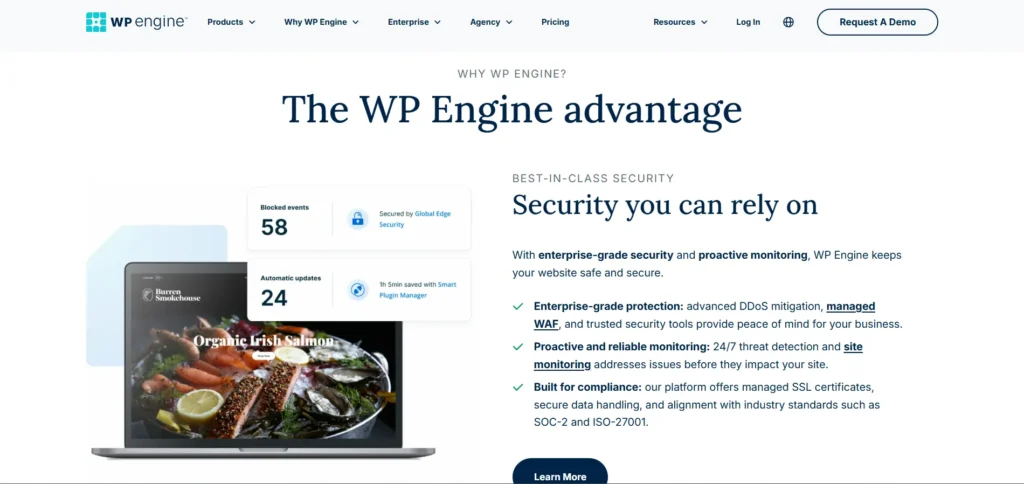
WP Engine includes built-in security features such as SSL certificates, malware scanning, daily backups, and automatic updates to keep your site secure. One of the standout features is the platform’s proactive approach to security, with a team of experts constantly monitoring and addressing potential threats. Furthermore, with WP Engine, you get server-level security, which adds another layer of protection that isn’t available with shared hosting options.
WP Engine also offers a dedicated firewall to prevent malicious attacks and a robust caching system to mitigate Distributed Denial-of-Service (DDoS) attacks. These advanced security protocols make WP Engine a great choice for businesses and high-traffic sites.
WordPress.com:
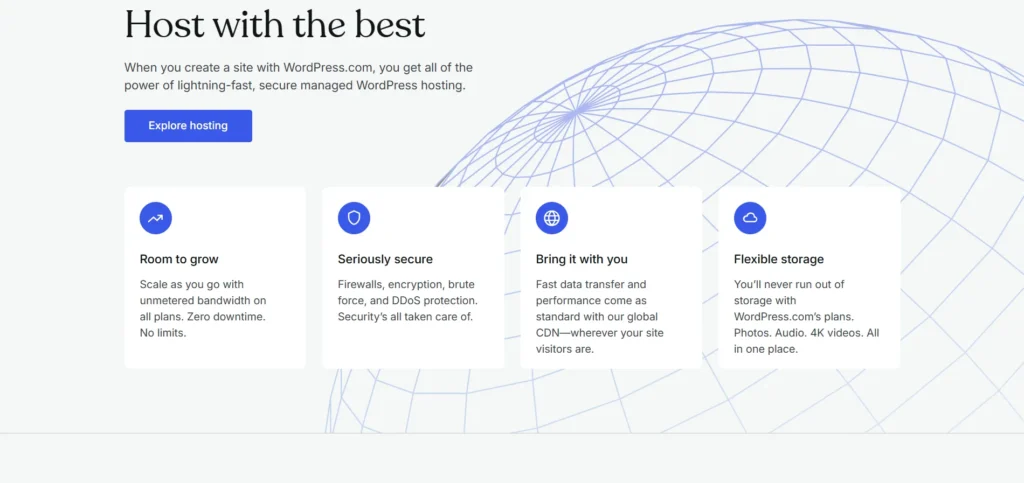
WordPress.com also provides SSL certificates, automatic updates, and basic security measures. While this is great for personal blogs or small business sites, it may not be enough for websites that require higher levels of protection. If you’re running a high-traffic site or an eCommerce store, you may want to consider WP Engine’s advanced security protocols.
WordPress.com has an excellent security record, but WP Engine’s managed hosting and its security expertise make it the more secure option, especially for businesses.
Support: WP Engine Wins with Expertise
Support is a crucial factor when choosing a hosting provider, especially if you’re running a business or a mission-critical website. Here, WP Engine outshines WordPress.com.
WP Engine:
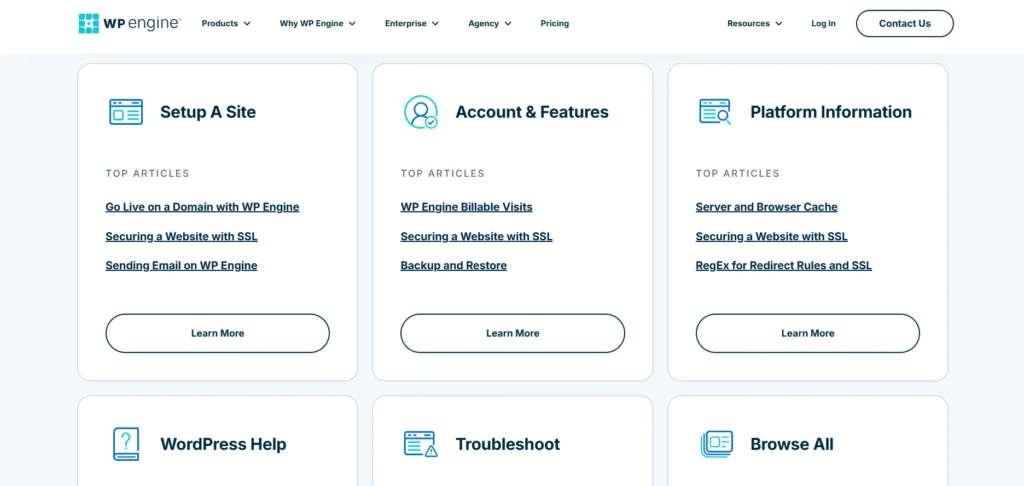
WP Engine is known for its excellent customer support. They offer 24/7 support via live chat, phone, and email. Their team of WordPress experts can assist with everything from troubleshooting issues to providing technical advice on how to optimize your site.
With WP Engine, you get access to a team of WordPress specialists who are well-versed in the nuances of the platform. Whether you’re having a technical issue or need help with custom configurations, WP Engine’s support team is available to guide you through the process.
WordPress.com:
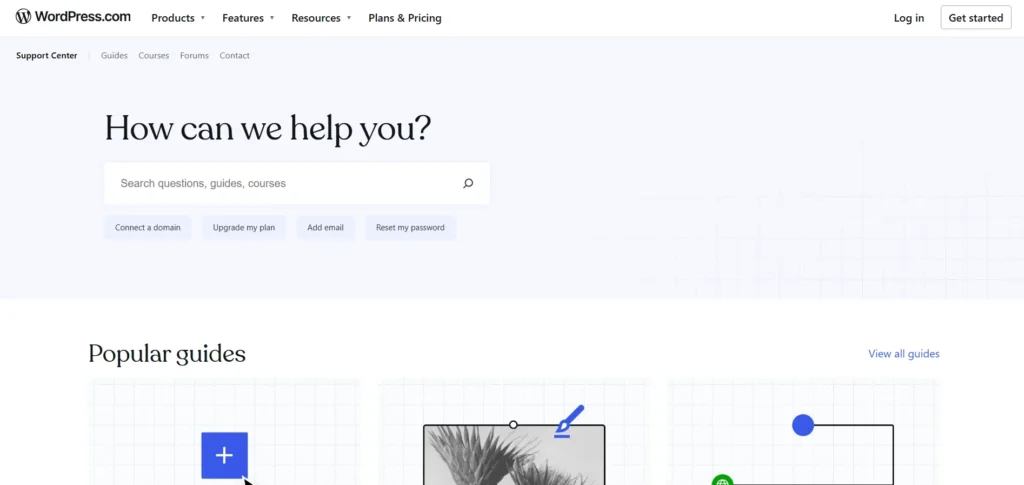
WordPress.com offers customer support through live chat and email, but the quality and speed of support can vary depending on the plan you choose. The free plan offers limited support, while higher-tier plans give you priority assistance. While WordPress.com’s support is generally helpful, it may not be as specialized as WP Engine’s, particularly if you run into complex issues.
For users who require high-quality, immediate assistance, WP Engine’s customer support is a major selling point.
Pricing: WordPress.com is More Affordable, but WP Engine Offers Better Value
Pricing is always an important factor to consider. WordPress.com offers a free plan, making it a great option for personal blogs and small websites that don’t require a lot of features. As you scale up, the pricing increases, but it still remains relatively affordable compared to WP Engine.
WP Engine:
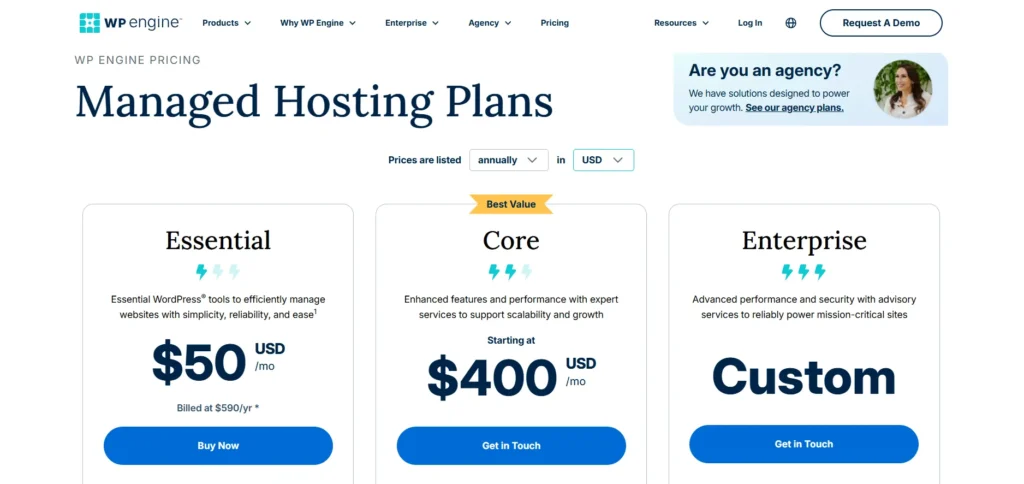
WP Engine’s pricing starts at $20 per month, which is higher than WordPress.com’s free or low-cost plans. However, with WP Engine, you’re paying for a premium managed hosting service that includes high-performance infrastructure, robust security, daily backups, and expert support. For businesses and websites that rely on speed, security, and support, WP Engine’s pricing is well worth it.
WordPress.com:
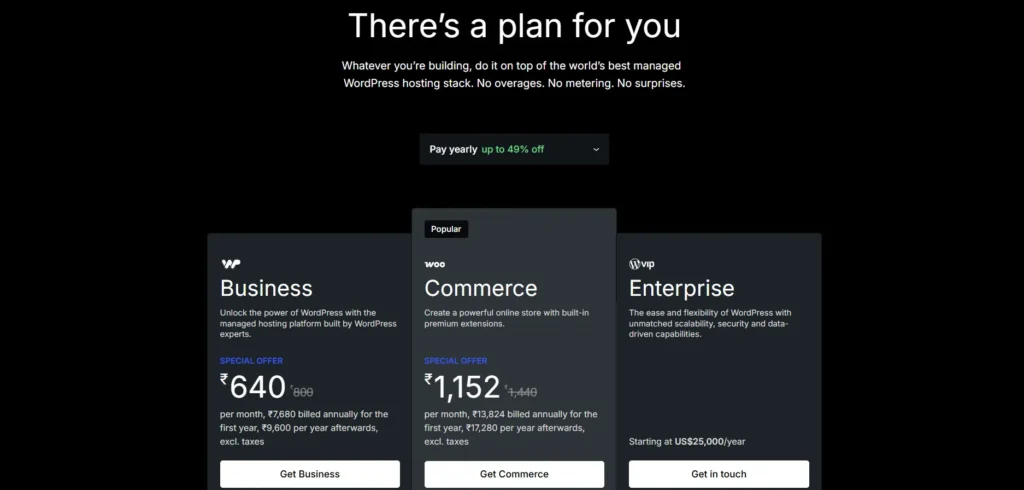
WordPress.com offers a free plan with limited features and a set of paid plans that range from $4 to $45 per month. While WordPress.com’s pricing is lower than WP Engine’s, the service doesn’t come with the same level of customization, performance, or support that WP Engine provides. For a personal blog or small business website, WordPress.com is a very affordable choice, but for businesses that require a higher level of service, WP Engine offers more value.
Conclusion: Why WP Engine Wins in Every Aspect
While both WP Engine and WordPress.com cater to WordPress users, they serve very different purposes and audiences. WordPress.com is great for beginners or those looking for an all-in-one solution, while WP Engine is tailored for businesses and developers who need high performance, flexibility, and specialized support.
WP Engine excels in every aspect, from speed and security to support and customization. While WordPress.com may be the more budget-friendly option, WP Engine’s premium service offers superior value for businesses that need to scale, maintain a high level of security, and require expert support.
For those serious about their WordPress websites, especially if it’s a business site or requires advanced customization, WP Engine is the clear winner.
FAQs
What’s the main difference between WP Engine and WordPress.com?
WP Engine is a managed hosting service focused on performance and customization, while WordPress.com is a website builder with hosting included.
Can I install custom plugins on WordPress.com?
You can only install custom plugins on WordPress.com with the Business plan or higher.
Which platform offers better performance?
WP Engine generally offers better performance due to its optimized WordPress hosting infrastructure.
Is WordPress.com free
Yes, WordPress.com offers a free plan with limited features, suitable for basic websites.
Which platform has better customer support?
WP Engine provides 24/7 expert support, while WordPress.com’s support varies by plan.
